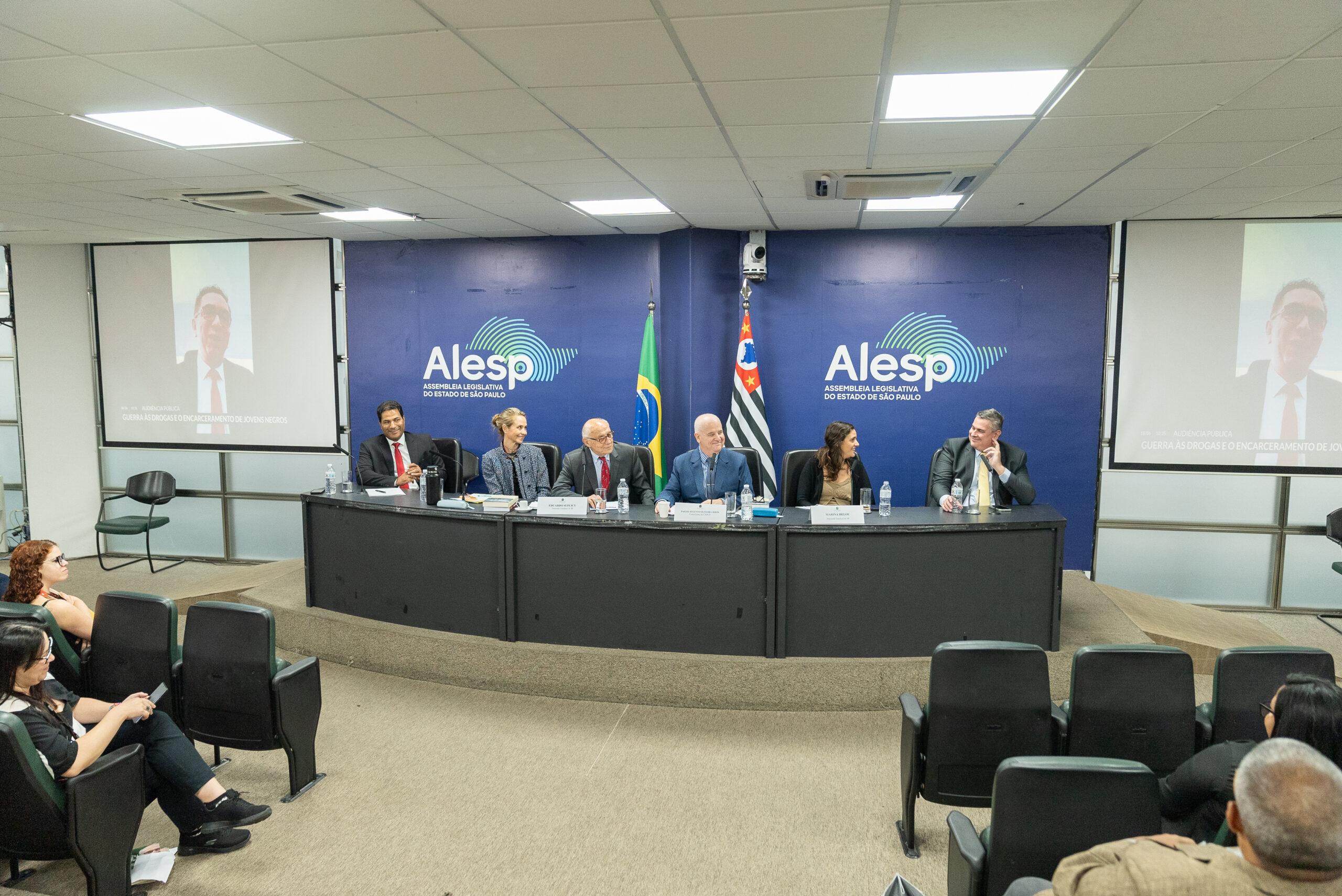On June 17th and 18th, the Working Group on Drug Policy and Incarceration of the National Council for Criminal and Penitentiary Policy organized public debates in São Paulo to discuss the war on drugs and mass incarceration of young Black people. Led by the president of the Humanitas360 Institute, Patrícia Villela Marino, the group brought together authorities, researchers, jurists and representatives of civil society in the CIVI-CO space and at the Legislative Assembly of the State of São Paulo.
The events, which were broadcast online, are part of the circuit of public hearings that the CNPCP is taking to different regions of the country to collect subsidies, data and information for the development of guidelines on drug policy and disincarceration. The first of these took place in May, in Brasília, at the headquarters of the Ministry of Justice and Public Security, to which the council is linked. New dates and locations will be confirmed soon.
The work in São Paulo was opened by a symposium held at the CIVI-CO social impact hub, where Humanitas360 is based. With opening words made by CNPCP advisor Bruno César Gonçalves da Silva, the event was divided into five parts. In the first of them, “National and International Drug Policy”, lawyers Cecilia Galício and Gabriella Arima (both from the Legal Network for Drug Policy Reform) and Dora Cavalcanti (Innocence Project Brasil) were heard. The second part, focused on public health, featured speeches by researchers Luciana Togni Surjus and Juliana Vicente (both from the DiV3rso Center: Mental Health, Harm Reduction and Human Rights at Unifesp), while the third, focused on psychedelics, heard the professor of neuropharmacology Marilia Zaluar (UFRJ and D’Or Institute). Lawyer Cristiano Maronna (Justa Platform) explained the effects of drug policies on the homeless population, the theme of the fourth part. Finally, judge José Henrique Rodrigues Torres, from the São Paulo Court of Justice, and criminal police officer Abdael Ambruster (Anti-Fascism Policemen) discussed the Brazilian criminal justice system. The symposium, which was mediated by Erick Araujo from USP’s Anti-Prohibitionist Observatory, ended with a speech by CNPCP advisor and law professor Mauricio Stegemann Dieter.
Watch in full below:
The following day, the CNPCP took the debate to the Paulo Kobayashi Auditorium at Alesp, where counselor and judge Paulo Irion opened the public hearing alongside the former minister of the Supreme Federal Court, Nelson Jobim, and state deputies Eduardo Suplicy, Marina Helou and Caio França, in addition to the remote participation of the president of the collegiate and judge Douglas de Melo Martins. Afterwards, the legislative house’s pulpit was opened to researchers and representatives of civil society and the State, including H360 advisor and social entrepreneur Reginaldo Lima, Juliana Borges (from the Black Initiative for a New Drug Policy), Joel Luiz Costa (Institute for the Defense of the Black Population), Solange Senese (Action for Peace), Marina Dias (Institute for the Defense of the Right to Defense), Paulo Mariante (ABGLT), Bruna Martins Costa (from the public security sector of the Ministry of Human Rights and Citizenship), Natalia Cardoso Amorim Maciel (Ipea), Diego Polachini and Bruno Shimizu (both from the Public Defender’s Office of São Paulo), Francisco Inácio Bastos (Fiocruz), Fabio Pereira (Amparar – Association of Friends and Relatives of Imprisoned People), Emerson Ferreira (Reflexões da Liberdade) and Sister Petra Pfaller (Prison Pastoral).
Watch the public hearing:
H360 was represented at both events by our president Patrícia Villela Marino, who is a full member of the CNPCP, and by project analyst and former imprisoned person Flávia Maria da Silva. The collaborators of the Tereza social business, which has the support of the institute and is made up of formerly imprisoned women, attended the public hearing at Alesp and sold products from their catalog during the symposium, in yet another exercise of active citizenship from our ecosystem.





